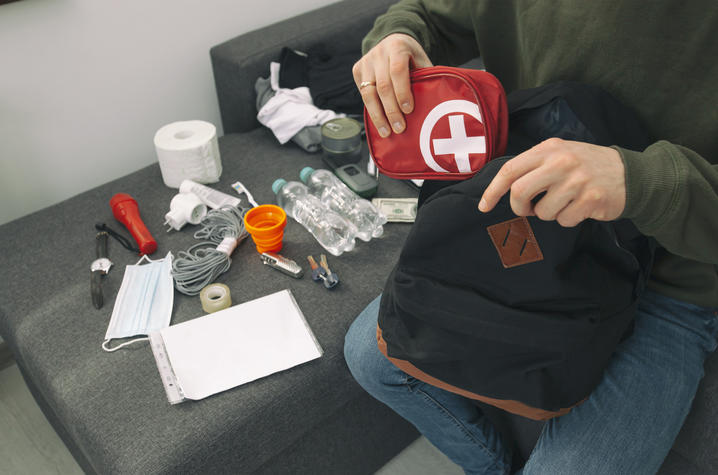What to know about epilepsy and providing first aid during a seizure

The University of Kentucky Public Relations and Strategic Communications Office provides a weekly health column available for use and reprint by news media. This week's column is by neurologist Jordan Clay, M.D., with UK HealthCare's Kentucky Neuroscience Institute.
LEXINGTON, Ky. (Nov. 13, 2023) — Epilepsy is a common neurological condition which leads to seizures. It affects millions of people in the United States and tens of millions worldwide.
It's important to know what epilepsy is, how to recognize what happens during a seizure, and how to provide first aid when someone is having a seizure.
What are epilepsy and seizures?
Epilepsy is a chronic brain disorder characterized by recurring seizures. Seizures are sudden, uncontrolled surges of electrical activity in the brain, which can cause various symptoms. The exact cause of epilepsy can vary, but it often results from brain injuries or genetics.
Often, people with epilepsy lead active lives, so you may not recognize that they have epilepsy unless they tell you or you actually witness them having a seizure.
What happens in the brain during a seizure?
During a seizure, the brain's normal electrical activity goes haywire. Neurons (brain cells) communicate with electrical impulses, but during a seizure, these impulses become chaotic.
Some describe a seizure as an “electrical storm of the brain.” This can lead to a wide range of symptoms — from blank stares to convulsions — depending on the affected brain areas. These symptoms can put a person at risk for injury.
Common seizure symptoms and warning signs
Epileptic seizures can manifest in various ways, but some common symptoms may include the following:
- Jerking movements: Involuntary muscle contractions leading to jerking or convulsions. This may be of just one side of the body, but can also be on both sides.
- Loss of consciousness: Some individuals may lose awareness and fall during a seizure.
- Staring spells: A person may appear unresponsive and stare into space.
- Strange sensations or auras: Some people experience odd smells, tastes or feelings before a seizure.
First aid
Recognition and immediate first aid during a seizure is crucial. While most seizures end on their own after 1-2 minutes, certain types can be life-threatening. Here's what you should know — and what you can do:
- Stay calm and reassure those around you. Always stay with the person through the end of the seizure.
- Protect their head. Gently guide the person to the ground if they're not already there. Put something soft under their head to prevent head injury.
- Clear the area. Make sure there are no hazards around, like sharp objects, that could harm the person during the seizure. Remove glasses or objects on or around the face.
- Keep track of time. If the seizure lasts longer than five minutes, or if another seizure begins shortly after without the person “coming to,” call for medical help.
- Do not restrain the person or put anything in their mouth. Contrary to common belief, it's essential to let the seizure run its course.
- Turn them on their side if they are on the ground. This helps lower the risk that a person could choke on any excess saliva or vomiting that may occur during the seizure.
- Some people have a “rescue medication,” commonly a nasal spray, that can be used to stop a seizure. If this is available, read the instructions and give the medication if the seizure goes on longer than expected.
- Most often, people return to normal after a seizure ends on its own. However, call for medical help if there is any concern for injury, difficulty breathing, choking or if the seizure occurred in water.
Seizure misconceptions
It's a common myth that someone might swallow their tongue during a seizure. This will not happen. Never put anything in their mouth, as it can lead to bite injury or choking.
Trying to restrain a person during a seizure or immediately after a seizure can result in injury to you or the person. Instead, focus on their safety by protecting their head and clearing the area.
Water won't stop a seizure. Do not pour water in their face. Stay with the person and provide support during the episode.
UK HealthCare is the hospitals and clinics of the University of Kentucky. But it is so much more. It is more than 10,000 dedicated health care professionals committed to providing advanced subspecialty care for the most critically injured and ill patients from the Commonwealth and beyond. It also is the home of the state’s only National Cancer Institute (NCI)-designated Comprehensive Cancer Center, a Level IV Neonatal Intensive Care Unit that cares for the tiniest and sickest newborns, the region’s only Level 1 trauma center and Kentucky’s top hospital ranked by U.S. News & World Report.
As an academic research institution, we are continuously pursuing the next generation of cures, treatments, protocols and policies. Our discoveries have the potential to change what’s medically possible within our lifetimes. Our educators and thought leaders are transforming the health care landscape as our six health professions colleges teach the next generation of doctors, nurses, pharmacists and other health care professionals, spreading the highest standards of care. UK HealthCare is the power of advanced medicine committed to creating a healthier Kentucky, now and for generations to come.




